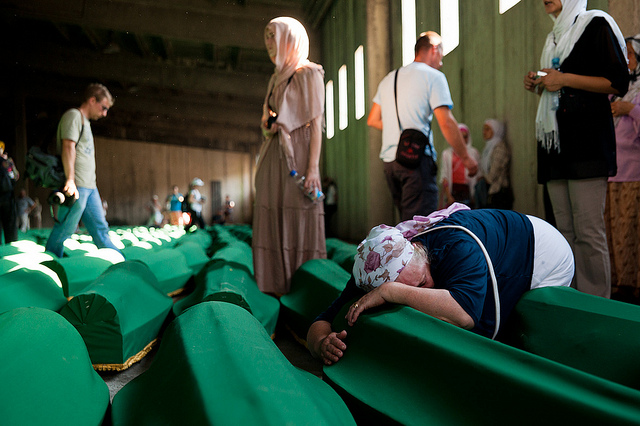This week’s best reads, podcasts and videos starting in 3, 2 …
Where did the idea for the Japanese submarine option (aka ‘Option J’) come from? Rex Patrick draws up a speculative history of the origins of Option J, tracking it back to influential figures in the Australian Embassy in DC as far back as 2000, under Prime Minister John Howard. Keep reading here.
Tomorrow will mark twenty years since the Srebrenica massacre, which took place during the Bosnian War. The casualties—over 7,000 Islamic men and boys as part of an ethnic cleansing campaign—contribute to what is considered the worst atrocity in Europe since WWII. As this horrific anniversary approaches, The Economist explores how that tragedy contributed to relative peace in Europe, and how it should serve as a cautionary tale to prevent genocide through early intervention.
How can the Arab world’s most promising and ambitious new democracy also be one of its greatest producers of violent jihadists? That’s the premise of Hugh Eakin’s new piece on Tunisia in The New York Review of Books.
Diplomat photojournalist Rohan Radheya was given the unique chance to visit factions of Organisasi Papua Merdeka’s (OPM) military wing in the tropical jungles of West Papua and capture their military drills on camera. The black and white images alternate between defiance and despair, with some capturing the moment when members sing the independence song ‘Hai Tanahku Papua’—an act of treason under Indonesian law that attracts a prison sentence of 15 to 20 years.
How does the Indonesian media see Australia? Over on AIIA, Marlene Millot looks at Australian portrayal in Indonesian media from the furore surrounding April’s executions to the current negotiations on asylum seekers. What’s the solution to both countries’ narrow perceptions of each other? Check it out here.
The New York Times reports that the number of refugees who have fled fighting in Syria has just reached 4 million people—roughly the population size of Sydney. Independent digital media project Syria Deeply has constructed this interactive map using UNHCR data to show how refugees and casualties are dispersed through the region. Explore the rest of the site for updates and a timeline.
Exciting times for the US Navy on the horizon; engineers at L-3 Maritime Systems are taking the next step towards developing integrated Hybrid Electric Drive (HED) Electric Propulsion Systems for the USN Arleigh-Burke-class destroyers. This new system is designed to help solve the USN’s high fuel consumption issues by using the vessel’s electrical power for propulsion at low speeds. The order should be finished by July 2016—watch this space.
And lastly, a challenger appears! A Japanese robot firm has accepted the challenge from a US firm in a fight-to-the-death duel (think Pacific Rim: Fight Club edition) between their giant human-piloted robots in a year’s time. Watch the Americans throw down the gauntlet on YouTube here.
Podcasts
Could India become a global hub for submarine maintenance and repairs? The Russians think so. In fact, there have been significant developments in the Indian Ocean region, with greater US–India maritime cooperation, active regionalism and the entrance of China. Hosted by Natalie Sambhi, listen to the latest CIMSEC Sea Control podcast with Scott Cheney-Peters and Nilanthi Samaranayake on these issues and more (30mins).
University of Melbourne’s Dave McRae is back with another Talking Indonesia podcast on foreign policy under President Jokowi featuring University of Indonesia’s international relations hard-hitter Dr Evi Fitriani (27mins).
Video
The Center for a New American Security (CNAS) recently held their annual conference themed ‘Charting America’s Course’. During the first session, Erin Simpson of Caerus Associates (below) grapples with the implications social issues like population trends and developments in technology. Also, watch Audrey Kurth Cronin, Michael Leiter, Michèle Flournoy and Karen De Young debate a better strategy for fighting ISIS.
Events
Canberra: the Australia–China Relations Institute (ACRI) is proud to announce the launch of ‘New Zealand’s China Policy: building a comprehensive strategic partnership’, the first comprehensive account of the relationship between New Zealand and China in trade, investment and foreign policy. Find out about Wellington’s China strategy at the ANU next Tuesday 14 July at 12pm. RSVP here.
Also in the nation’s capital, join Dr Knut Dormann of the International Committee of the Red Cross for a discussion on the relevance of international humanitarian law in the context of terrorism, and how IHL applies to the activities of non-state armed groups, such as ISIS. It’s on the ANU, Tuesday 21 July at 6pm. More info here.


